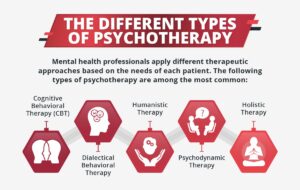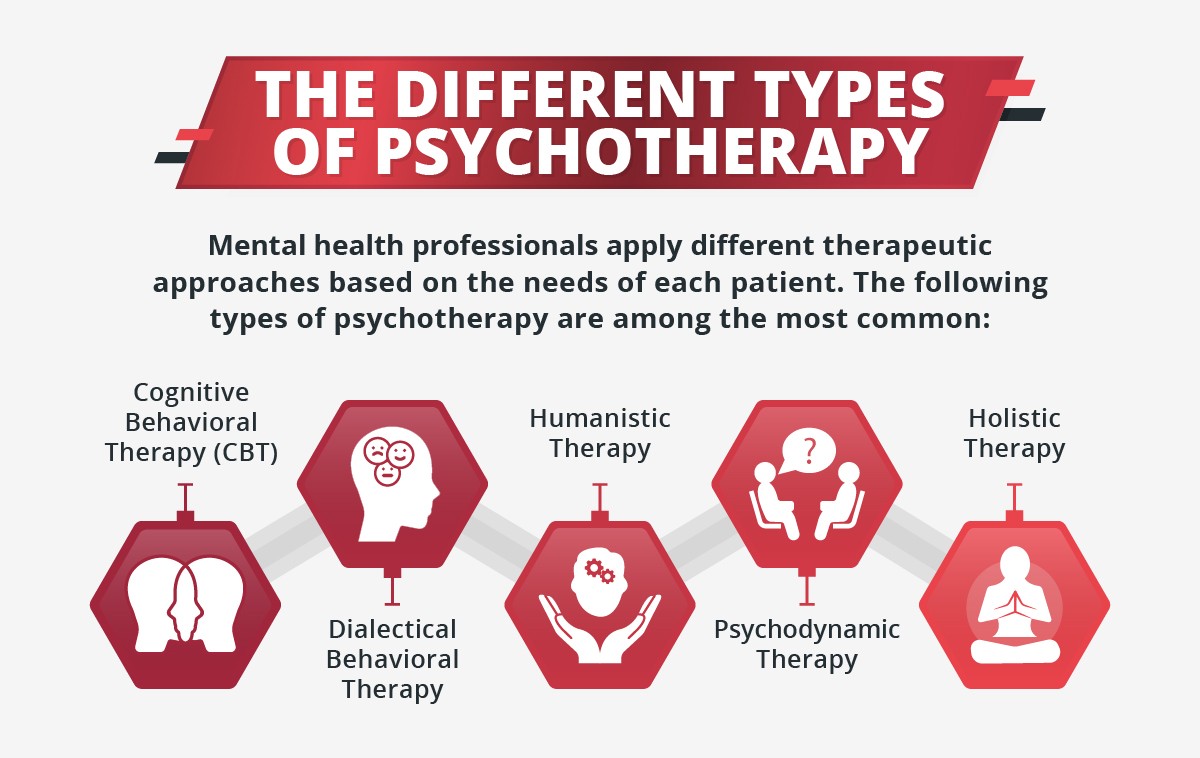Introduction

Mental health challenges are becoming increasingly common, but thankfully, modern psychotherapy offers effective solutions. From managing stress and anxiety to overcoming depression and addiction, psychotherapy provides tools to heal the mind and regain control over life. At New Soch Rehab and Psychiatrist Center Islamabad, recognized as the leading Psychiatrics Treatment Center in Islamabad, we offer a wide range of psychotherapy methods tailored to individual needs.
This article explores the different types of psychotherapy, how they work, and why choosing the right psychiatric care is essential for recovery.
1. What is Psychotherapy?
Psychotherapy, also known as talk therapy, is a professional process where a trained psychiatrist or psychologist helps individuals manage emotional, psychological, and behavioral issues. Unlike medication alone, psychotherapy focuses on addressing root causes, building coping skills, and fostering long-term mental well-being.
At New Soch Rehab, psychotherapy is delivered in a safe, confidential, and supportive environment.
2. Why Choose a Psychiatrics Treatment Center in Islamabad?
Many people struggle silently with mental health conditions due to stigma or lack of awareness. However, seeking help from a professional Psychiatrics Treatment Center in Islamabad ensures:
-
Accurate diagnosis of mental health conditions
-
Access to evidence-based psychotherapy treatments
-
Support from experienced psychiatrists and therapists
-
Personalized recovery plans for long-term healing
New Soch Rehab and Psychiatrist Center Islamabad stands out for its holistic approach, combining psychotherapy, medication (if required), and lifestyle counseling.
3. Different Types of Psychotherapy and How They Work
3.1 Cognitive Behavioral Therapy (CBT)
CBT is one of the most popular forms of psychotherapy. It helps patients identify negative thought patterns and replace them with healthier perspectives.
-
Used for: Depression, anxiety disorders, phobias, and stress.
-
How it works: Through structured sessions, therapists challenge irrational beliefs and train patients to adopt positive coping strategies.
3.2 Dialectical Behavior Therapy (DBT)
A specialized form of CBT, DBT focuses on regulating emotions and improving relationships.
-
Used for: Borderline personality disorder, suicidal thoughts, and self-destructive behaviors.
-
How it works: Patients learn mindfulness, emotional regulation, and distress tolerance techniques.
3.3 Psychodynamic Therapy
Rooted in Freudian psychology, psychodynamic therapy explores unconscious thoughts and past experiences that influence present behavior.
-
Used for: Long-term emotional struggles, unresolved trauma, and self-esteem issues.
-
How it works: By discussing memories and emotions, patients gain deeper self-awareness and healing.
3.4 Humanistic Therapy
This therapy emphasizes self-growth and personal potential.
-
Used for: Self-confidence, life purpose, and overcoming existential crises.
-
How it works: Therapists provide empathy and unconditional support, empowering patients to find meaning in life.
3.5 Interpersonal Therapy (IPT)
Focused on improving relationships, IPT addresses how social interactions affect mental health.
-
Used for: Depression, grief, and relationship conflicts.
-
How it works: Patients learn communication skills and strategies to build healthier relationships.
3.6 Family and Group Therapy
In many cases, therapy is more effective when families or groups are involved.
-
Used for: Addiction recovery, family conflicts, and adolescent mental health issues.
-
How it works: Encourages open dialogue, mutual support, and collective healing.
3.7 Exposure Therapy
Exposure therapy is often used to treat phobias and post-traumatic stress disorder (PTSD).
-
Used for: Anxiety, PTSD, and phobias.
-
How it works: Patients are gradually exposed to their fears in a controlled environment, reducing sensitivity over time.
3.8 Eye Movement Desensitization and Reprocessing (EMDR)
A relatively new technique, EMDR is highly effective for trauma recovery.
-
Used for: PTSD and traumatic experiences.
-
How it works: Therapists use guided eye movements to help patients reprocess traumatic memories in a less distressing way.
4. Choosing the Right Psychotherapy for You
Not all therapies work the same for everyone. Factors such as age, personality, severity of condition, and individual goals determine the right approach. At New Soch Rehab and Psychiatrist Center Islamabad, our experts assess each patient thoroughly before recommending a treatment plan.
5. Benefits of Psychotherapy
-
Reduces symptoms of depression and anxiety
-
Improves communication and relationships
-
Boosts confidence and self-awareness
-
Enhances problem-solving and coping skills
-
Provides long-term tools for resilience
6. Why New Soch Rehab is the Best Psychiatrics Treatment Center in Islamabad
New Soch Rehab and Psychiatrist Center is committed to transforming lives through compassionate care and professional excellence. We combine psychotherapy with holistic approaches, ensuring patients recover not only mentally but also emotionally and socially.
Our center provides:
-
Experienced psychiatrists and therapists
-
Modern therapeutic techniques
-
Confidential, safe, and supportive environment
-
Tailored treatment plans for every patient
7. Frequently Asked Questions (FAQs)
Q1. What is the difference between psychotherapy and counseling?
Psychotherapy is often longer-term and focuses on deeper psychological issues, while counseling typically addresses immediate life challenges.
Q2. How many sessions of psychotherapy are needed?
The number varies depending on the patient’s condition. Some require short-term therapy (6–12 sessions), while others benefit from ongoing support.
Q3. Can psychotherapy replace medication?
In some cases, yes. However, for severe mental health conditions, a combination of medication and therapy is often most effective.
Q4. Is psychotherapy confidential at New Soch Rehab?
Absolutely. Every session is completely private and confidential.
Q5. Does insurance cover psychotherapy sessions in Islamabad?
Coverage varies depending on the insurance provider. It’s best to check with your insurance company.
Q6. How do I book an appointment at New Soch Rehab?
You can contact our center directly through phone or visit our official website for appointment booking details.
Conclusion
Mental health is just as important as physical health, and seeking professional help is a sign of strength, not weakness. Whether you’re struggling with depression, anxiety, trauma, or relationship issues, psychotherapy provides a path to healing.
At New Soch Rehab and Psychiatrist Center Islamabad, the leading Psychiatrics Treatment Center in Islamabad, we ensure every patient receives personalized, evidence-based care for lasting recovery.
👉 Take the first step toward a healthier mind—reach out today and begin your journey of transformation.


